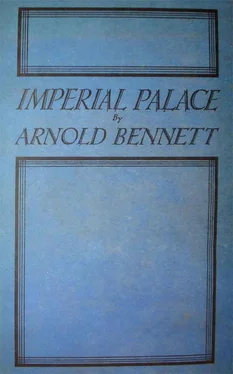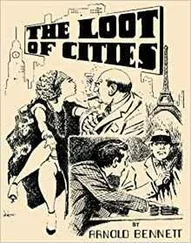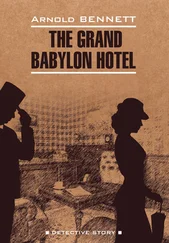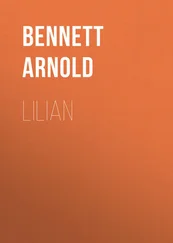Arnold Bennett - Imperial Palace
Здесь есть возможность читать онлайн «Arnold Bennett - Imperial Palace» — ознакомительный отрывок электронной книги совершенно бесплатно, а после прочтения отрывка купить полную версию. В некоторых случаях можно слушать аудио, скачать через торрент в формате fb2 и присутствует краткое содержание. Жанр: unrecognised, на английском языке. Описание произведения, (предисловие) а так же отзывы посетителей доступны на портале библиотеки ЛибКат.
- Название:Imperial Palace
- Автор:
- Жанр:
- Год:неизвестен
- ISBN:нет данных
- Рейтинг книги:4 / 5. Голосов: 1
-
Избранное:Добавить в избранное
- Отзывы:
-
Ваша оценка:
- 80
- 1
- 2
- 3
- 4
- 5
Imperial Palace: краткое содержание, описание и аннотация
Предлагаем к чтению аннотацию, описание, краткое содержание или предисловие (зависит от того, что написал сам автор книги «Imperial Palace»). Если вы не нашли необходимую информацию о книге — напишите в комментариях, мы постараемся отыскать её.
Imperial Palace — читать онлайн ознакомительный отрывок
Ниже представлен текст книги, разбитый по страницам. Система сохранения места последней прочитанной страницы, позволяет с удобством читать онлайн бесплатно книгу «Imperial Palace», без необходимости каждый раз заново искать на чём Вы остановились. Поставьте закладку, и сможете в любой момент перейти на страницу, на которой закончили чтение.
Интервал:
Закладка:
“Obey your venerable chairman, gentlemen,” murmured Dennis Dover, and raised his mighty bulk and filled the glasses of Messrs. Dacker and Smiss with Waterloo brandy (which Mr. Lingmell said was so old as to be indistinguishable from water). “Your alarm does you credit, seeing that you won’t have to speechify at the meeting and that you hold no shares worth mentioning, and that if the Palace goes to pot the ancient prestige of the Palace will set forty hotels fighting for your services. . . . To the Resolution! To the Resolution!”
The toast was drunk, but by Evelyn and Mr. Levinsohn in Malvern water; and the Chairman descended cautiously back into his chair.
Mr. Dover had a good right to the position he held in the Company. Not merely was he the largest shareholder. His father, aged fifty odd when Dennis was begotten in the hotel itself, had built the original Palace. He had first called it the Royal Palace, because of its proximity to Buckingham Palace; but in 1876, when Disraeli made Queen Victoria Empress of India, Mr. Dover had loyally changed ‘Royal’ to ‘Imperial.’ The name Palace had been copied all over the world. Dennis always maintained that the French use of the word palace as a generic term for large luxury hotels had derived from the reputation of the original Palace for luxury, and was not due to the prevalence of imitative Palace Hotels throughout Europe.
In the late fifties the Palace luxury had made it the wonder of the earth. It was then reputed to have a bathroom on every floor; and some people stayed in it in order to see what a bathroom was really like. Then a Crown Prince stayed in it, then a monarch, and Queen Victoria would recommend it to some of her foreign distant cousins. Soon the Palace had established two royal suites. Soon, despite the fact that every hotel-expert in London had condemned it as being too impossibly big, it became too small, and the elder Dover had enlarged it. More than once it had been enlarged, altered, re-planned, reconstructed; but the Queen Anne character of its charming façade had always been preserved. The last and greatest and most ruthless of the enlargers was Evelyn. When Evelyn had finished—but he had never finished—all that had survived of the original Palace was the Queen Anne character of the façade; not the façade, only the character.
II
As a child Dennis Dover had lived under the roof of the Palace in its most majestic days. The elder Dover had amassed incalculable money under that roof. But he had made a common mistake. He had forgotten that the earth revolves. He had assumed that luxury could go no farther than his luxury had gone. When he died, rich, though not as rich as in the grandest days, the Imperial Palace, with all its unique prestige, was beginning to be a back number. Trustees under the will of the founder had done no better than trustees usually do. Then Dennis Dover had taken command, and the public had been invited to buy the Imperial Palace. The public, ingenuous as ever, and blinded by the glitter of prestige, had bought. The Palace recovered a little, lost ground a little, recovered a little, paid a dividend, passed its dividend, and was on the very edge of being transmogrified into a block of superlative flats, when Dennis Dover had chanced to sojourn at the Wey Hotel and to find Evelyn, then in his thirties.
In ten years Evelyn, starting as an invalided A.S.C. officer towards the end of the war, and spending three-quarters of a million borrowed in instalments with much difficulty on debentures, had, after the formation of a new company, made the Palace for the second time in its career the wonder of the wide world. Twice in its career the prestige of the Palace had thus shot up like a rocket; but Evelyn had no intention that it should ever fall like a rocket.
Such, perhaps too briefly stated, was the history of the Imperial Palace Hotel, whose royal suites, owing to a dearth of royalty, were now occupied by cinema-kings, presidents of republics, and similar highnesses.
As the six passed in irregular formation through corridors and downstairs towards the larger banqueting-room (called the Imperial—the smaller banqueting-room was called the Royal) Dennis Dover stepped between Dacker and Smiss, and putting a hand paternally on the nearest shoulder of each of them, and looking down from his superior height at their upturned young faces, squeakily murmured:
“You don’t mind me referring to the colour of your livers, boys? Sign of affection.”
They smiled. They knew their own worth; and they hoped that the Chairman knew it and knew also that their interest in the Palace was fanatical, and that they were intensely proud of having been elevated to the Board at a cost to themselves of only a hundred qualifying shares each. What they did not know was that father Dennis Dover loved them the more for their apprehensiveness concerning the Resolution.
The Chairman himself was apprehensive, but he was old enough to be a fatalist; and the risks attending a resolution to be proposed at a meeting of a limited liability company could arouse no emotion in one who would soon be crossing the supreme frontier. Old Lingmell was equally unmoved, but not for the same reasons as father Dennis. He never spent time in thinking about the supreme frontier. His investments were secure, and the earth and the fruits thereof were good enough for him. Mr. Levinsohn felt no emotion either; for him the matter was strictly professional, one among a hundred such matters. As for Evelyn, he felt a certain anxiety; but he was built on a rock, the rock of his creative, organising brain, which the foolishness of no shareholders could damage, which was more valuable than any investments, and which had a world-market waiting to compete for it.
Chapter XXI – SHAREHOLDERS
I
The six men sat in a row behind a long green-topped table at one side of the square-shaped Royal banqueting-room; and ageing Mr. John Crump, secretary of the Imperial Palace Hotel Company and a member of Evelyn’s directorial staff, sat at one end of the table, with minute-books, balance-sheets, the register of shareholders, and—most important of all—a pile of proxies, under his hand. The Chairman and Evelyn were in the middle of the six, who had no documents beyond a sheet or two of rough notes or blank paper. Evelyn discouraged the exhibition of documents in business, and father Dennis, with whom his understanding was always sympathetically perfect, regarded documents as a symptom of a fussy mind.
In front were the shareholders, two or three hundred of them, including a few women, ranged in rows on the brilliant parti-coloured and gilded banqueting chairs, and each holding a copy of the white annual report and accounts.
Those chairs, with the rich pendant chandeliers, were the sole reminder of the original purpose of the spacious chamber. At night, and sometimes at the lunch-hour, tables were joined together in lengths, in the shape of an E, or a rake, or a Greek letter, or a horse-shoe; they were white, then, covered with china, plate, cutlery and glass, flower-decked, gleaming, brilliantly convivial; and the people sitting round them, ceremonially clad, grew more and more jolly under the influence of the expensive succulence provided by Maître Planquet; until by the time the speeches had begun and the cohort of waiters, marshalled by Amadeo Ruffo, the Banqueting-manager, had vanished away through the service-doors, every banqueter had become the most lovable and righteous person of his or her sex, in every breast all food and drink had been transformed by a magical change into the milk of human kindness, and the world had developed into the best of all possible worlds: with the final result that the attendants in the cloak-room received tips far exceeding the ordinary.
Now, the scene was dramatically different. The rows of shareholders, some stylish some dowdy, some harsh some gentle, some sagacious some silly, some experienced some ingenuous, some greedy some easily satisfied, some avaricious some generous, were all absorbed in the great affair of getting money—the money which paid for banquets. A nondescript, unpicturesque, and unfestive lot, thought Evelyn, who knew a number of them by sight and a few by name. Some faces were obviously new, and Evelyn looked at these with suspicion.
Читать дальшеИнтервал:
Закладка:
Похожие книги на «Imperial Palace»
Представляем Вашему вниманию похожие книги на «Imperial Palace» списком для выбора. Мы отобрали схожую по названию и смыслу литературу в надежде предоставить читателям больше вариантов отыскать новые, интересные, ещё непрочитанные произведения.
Обсуждение, отзывы о книге «Imperial Palace» и просто собственные мнения читателей. Оставьте ваши комментарии, напишите, что Вы думаете о произведении, его смысле или главных героях. Укажите что конкретно понравилось, а что нет, и почему Вы так считаете.












